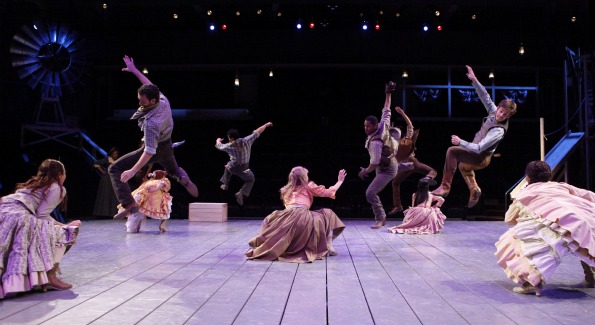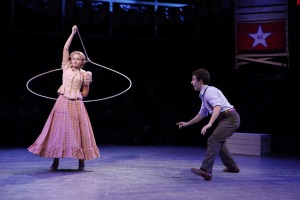Time is running out to catch some of DC’s top-selling tickets like Oklahoma!, Candide, South Pacific and Sunset Boulevard.
By Ann Geracimos

The company of the Arena Stage at the Mead Center for American Theater production of Rodgers and Hammerstein’s Oklahoma! October 22-December 30, 2010. Photo by Carol Rosegg.
‘Make a joyful noise,’ one of the holiday season’s favorite verses, never rang truer than on four prominent Washington stages these days. No fewer than four large musical theater pieces are on tap – likely a record but also a tribute to the professionalism current in a city long thought of as offering merely ‘regional fare.’
Audiences can see Broadway quality without paying Broadway prices or paying their way north for the thrill. So-called regional talents, critics say, are proving their worth as never before.
An original interpretation of Rodgers and Hammerstein’s “Oklahoma!” (yes, the exclamation point belongs in the title) opened the $136 million dollar remodeling of Arena Stage in the District’s Southwest and featured a local high school girl almost stealing scenes from veteran players. It closes December 30 and has been rumored to be a candidate for transfer to Broadway sometime in the future.
“Candide,” a co-production with Chicago’s Goodman Theatre, is at Shakespeare Theatre Company’s Harman Hall through January 9. A lively version of Voltaire’s book, it has the powerhouse score by Leonard Bernstein with lyrics by Richard Wilbur and other top-notch legendary names.
A touring production of Rodgers and Hammerstein’s “South Pacific” has come from Lincoln Center to the Kennedy Center Opera House through January 16. Twenty of the 26 musicians in the orchestra are local. With a stay of five weeks, the show is one of the longest running ever seen in that house.
Andrew Lloyd Webber’s interpretation of the 1950 classic movie “Sunset Boulevard” has been adapted by Eric Schaeffer, a recognized connoisseur of the musical theater genre, for Arlington’s Signature Theatre with an 18-member cast and a 20-member orchestra. It closes February 13.

June Schreiner as Ado Annie Carnes and Cody Williams as Will Parker in the Arena Stage at the Mead Center for American Theater production of Rodgers and Hammerstein’s Oklahoma! October 22-December 30, 2010. Photo by Carol Rosegg.
“Oklahoma!” has sold out and “South Pacific” was given a big send-off by Peter Marx in The Washington Post who called the revival “as close to a definitive revival of the show as audiences are likely to encounter. It’s also the most expensive of all the current offerings, with its cast of 34.
The 26-member orchestra is said to be the largest orchestra of any touring Broadway production in the country. “It’s a confluence of wonder to have four good productions running simultaneously. We are extremely fortunate,” confirms noted DC arts patron Victor Shargai. “The quality and variety is marvelous.”
Such confluence might also reflect the uses of nostalgia as comfort zone as well as the growing affluence of educated Washington audiences. People in general are fond of musicals, agreed, but, adds Shakespeare’s Artistic Director Michael Kahn, who chose the Mary Zimmerman interpretation of ‘Candide,” “it’s very nice to have enough local musicians for four shows.”
Larger-than-usual bands or orchestras aren’t hired simply for bragging rights. The aesthetics of the genre are dramatically enhanced by a big sound. Mr. Shargai attributes the risk of theater producers willing to undertake expensive entertainment of this nature to faith in Washington audiences. He calls them “very sophisticated,” a comment buttressed by Mr. Kahn who says “Candide” cast members “get knowing responses from the audience they never got in Chicago. There is a sense of quickness and response to the irony and issues involved.”
If Shakespeare audience members miss having a full orchestra in the pit – this “Candide” only has 11 plus the conductor, they might take heart knowing that all the musicians are local hires.
Tickets for ‘Candide” – only the second musical ever done by the company and the first from American creative artists – are at record levels. Playwright Voltaire set out to spoof the mindless optimism of his day and specifically the deceit practiced by 18th century civil and religious leaders, much of which is readily familiar in present day battles played out on Washington’s political stages. The only other musical done by the company was “The Beggars Opera” under Michael Kahn’s direction during his first year at the institution. He sees the selection of “Candide” as logical, given the company’s mandate to “do plays from the past.
”
There is a limit, however. He doesn’t foresee the company taking on anything from Andrew Lloyd Webber: “Not unless he would do a musical of ‘Medea” or a similar classic.
”
“Sunset Boulevard, ” a Tony-award winning show that stars the nationally-known Florence Lacey, is being performed in the smallest space a musical of this kind can operate. Even so, a 20-piece ensemble is the largest that theater ever has had for one of their musicals – about one for every 14 viewer. According to The Washington Post, that represents about a quarter of the show’s budget.

Mr. Schaeffer, known for miracles in transforming Stephen Sondheim’s works, will tackle another version of Sondheim’s “Follies” in the spring at Kennedy Center starring Bernadette Peters. Signature’s past revivals have included “My Fair Lady,” “Showboat,” and “A Little Night Music.
”
Arena also lays claim to a history of popular musicals, having put on in the past “South Pacific,” “ Sophisticated Ladies,” “ The Fantastiks,” and “Next to Normal.” The latter went on to Broadway, as did Kennedy Center’s own production of “Ragtime.”
Mr. Marx, remarking about the existence of so many quality offerings at once, said in a recent radio interview that revivals have become “a sort of brand here,” in part because there are so many solid actors to do the shows.
New York Times’ writer Peter Healy last month noted how only two musical revivals are set for the 2010-11 Broadway season so far, “ with the promise of a third.” He quotes New York theater mogul Theodore S. Chapin saying how impressed he had been with the decision of Arena Stage’s artistic director Molly Smith to use multiracial casting the 1943 favorite.
The role in “Oklahoma!” of farmhand Curley is portrayed by Latino actor Nicholas Rodriquez; leading lady Laurey is played by black actress Eleasha Gamble; E. Faye Butler, another African-American, plays Laurey’s strong, steadfast Aunt Eller. Sixteen-year-old June Schreiner of Reston, a junior at the Madeira School, beat out older and more experienced performers for the energetic role of Ado Annie. She twirls ropes, sings, and sparkles throughout.
